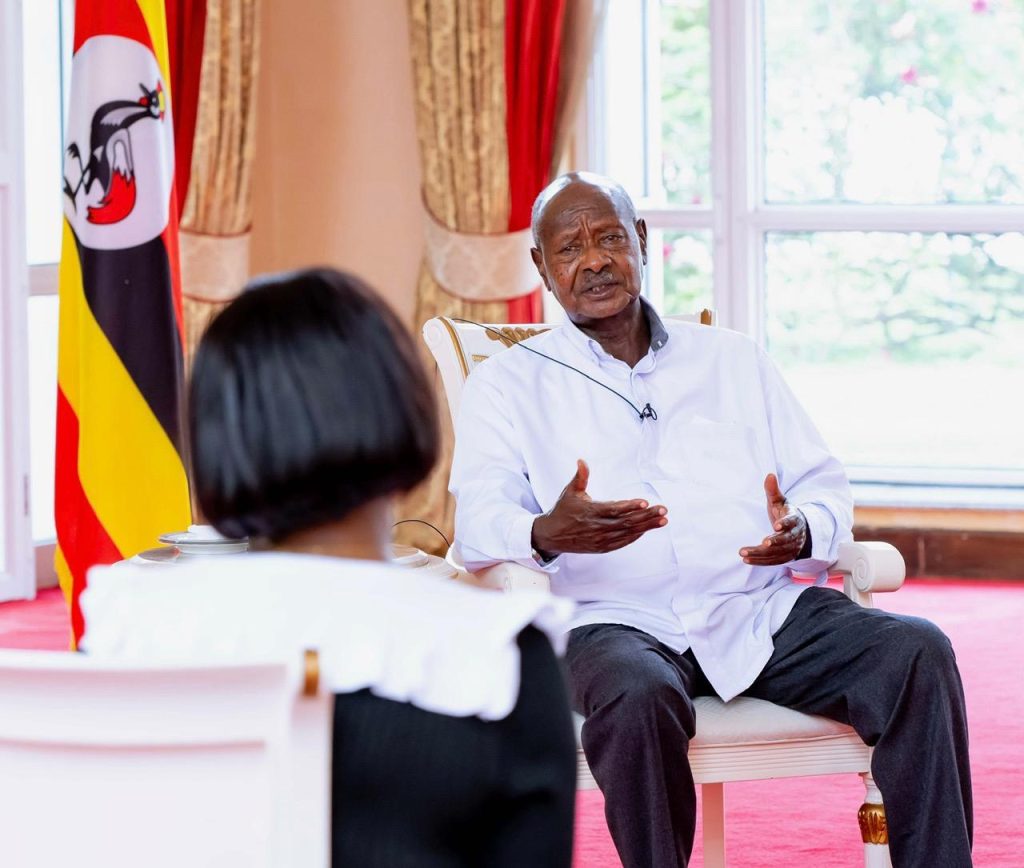In a wide-ranging exclusive interview with Russia Today (RT) on April 26, 2025, Ugandan President Yoweri Museveni articulated his strategic vision for Uganda’s engagement with the BRICS alliance, East Africa’s evolving role in global affairs, and the deepening partnership with Russia.
The sit-down, hosted by the Russian state-run outlet, offered insights into Museveni’s geopolitical priorities as he navigates a complex international landscape marked by tensions with the West and opportunities in the Global South.

Embracing BRICS: A Path to Economic Sovereignty
Museveni expressed strong enthusiasm for Uganda’s potential role in the BRICS alliance, which he views as a critical platform for countering Western economic dominance and fostering equitable global partnerships.
Uganda, invited as a BRICS partner country in November 2024, is actively considering deeper integration, with Foreign Minister Jeje Odongo confirming the nation’s deliberations.
Museveni highlighted the New Development Bank’s lending model, which he described as less predatory than Western financial institutions, offering Uganda opportunities to diversify funding and reduce reliance on the U.S. dollar.
“BRICS is about mutual benefit,” Museveni stated, emphasizing its alignment with Uganda’s economic goals.
He pointed to the bloc’s support for de-dollarization and trade in national currencies, which could alleviate Uganda’s debt burdens and enhance trade with emerging markets.
With a GDP heavily reliant on agriculture and natural resources, Museveni sees BRICS partnerships as a gateway to foreign investment in oil, minerals, coffee, and tea.
The president also underscored BRICS’ potential to amplify Africa’s voice in global governance.
Citing the 2024 Kazan Summit, where 36 countries, including African nations like South Africa, Egypt, and Ethiopia, convened, Museveni praised the bloc’s expansion and its rejection of Western hegemony.
He argued that BRICS’ non-interference policy resonates with African nations seeking to escape neo-colonial economic structures.

East Africa’s Rising Influence
Museveni positioned East Africa, and Uganda in particular, as a dynamic player in the global arena, describing Uganda as the region’s “center of gravity.”
He highlighted East Africa’s economic potential, noting an 11% return on investment compared to 9% in Europe and 8% in Latin America.
“We invite BRICS nations to invest in our railways, electricity, and tourism,” he said, specifically mentioning projects like the East African crude oil pipeline and regional railway networks.
The president framed East Africa’s role as not just economic but also geopolitical.
Uganda’s leadership in regional peacekeeping, including missions in South Sudan and Somalia, aligns with BRICS’ support for African Union initiatives, potentially strengthening Uganda’s security influence.
However, Museveni criticized historical Western policies that confined African economies to raw material exports, citing coffee as an example: “Africa earns $2.4 billion from a $460 billion global market. This must change.”
He advocated for value-added industries and economic integration to resist neo-colonialism, a stance echoed in his push for African markets over Western dependence.
Strengthening Ties with Russia
Museveni’s interview underscored a robust and growing relationship with Russia, rooted in historical solidarity and mutual interests.
He praised Russia’s support for Africa’s anti-colonial struggles, dating back to the Soviet era, and noted consistent cooperation, particularly in defense and technology.
“There was a small gap during Russia’s unstable period after Gorbachev, but we are back on track,” he said.
In 2023, Russia provided Uganda with a $100 million military aid package, bolstering its defense capabilities.
Museveni proposed further Russian investment in oil exploration, refining, and infrastructure, aligning with Russia’s broader push to expand its African footprint.
He also highlighted health cooperation, referencing the Russia-Africa Health Summit hosted in Kampala, which showcased Uganda’s role in Russia’s health diplomacy.
On the Russia-Ukraine conflict, Museveni maintained Uganda’s neutral stance, having abstained from UN votes condemning Russia.
He criticized Western “imperialists” for escalating the conflict by interfering in Ukraine, arguing that neutrality is the path to resolution.
“Why should we take sides in other people’s wars?” he asked, reinforcing Uganda’s non-aligned foreign policy.

Navigating Western Tensions
Museveni’s embrace of BRICS and Russia comes amid strained relations with the West, particularly over human rights and governance issues.
The 2023 Anti-Homosexuality Act, which prompted sanctions from the U.S. and World Bank loan freezes, was a focal point in the interview.
Museveni defiantly noted that Uganda’s economy grew by 6% despite these measures, proving its resilience.
“They came back saying we are good people. We say they are welcome,” he quipped, signaling a pragmatic approach to re-engaging the West while diversifying partnerships.
The president’s critics, however, argue that his 39-year rule has entrenched authoritarianism, with recent actions like the arrest of opposition leader Kizza Besigye and the jailing of a TikToker for insulting Museveni drawing international condemnation.
Human Rights Watch and the UN have criticized Uganda’s use of military courts for civilians and restrictions on free expression, issues Museveni dismissed as necessary for national stability.
Geopolitical Balancing Act
Museveni’s foreign policy reflects a delicate balancing act. While aligning with BRICS and Russia, Uganda remains engaged with Western institutions like the Commonwealth and maintains economic ties with the U.S. and UK, despite recent tariff disputes.
His son, Lt. General Muhoozi Kainerugaba, has fueled anti-Western sentiment, though he recently endorsed Museveni’s 2026 re-election bid, dispelling succession rumors.
Analysts see Museveni’s pivot to Russia and BRICS as a strategic response to Western pressure, but his non-aligned rhetoric—“I am pro-myself”—suggests a pragmatic approach to maximize Uganda’s options.
“We trade with all who bring value, without adopting their enmities,” he said, encapsulating his vision for a multipolar world order.
Looking Ahead
As Uganda weighs BRICS partnership, Museveni’s government faces domestic challenges, including youth-led anti-corruption protests and opposition claims of electoral manipulation.
Yet, his focus on economic integration, regional leadership, and strategic alliances positions Uganda as a key player in Africa’s evolving geopolitical landscape.
The RT interview, amplified by the Russian Embassy in Uganda, underscores Museveni’s intent to project Uganda’s voice globally while countering Western narratives.
Whether his vision translates into tangible gains for Uganda’s 46 million citizens remains a critical question as the nation navigates its place in a rapidly changing world.

